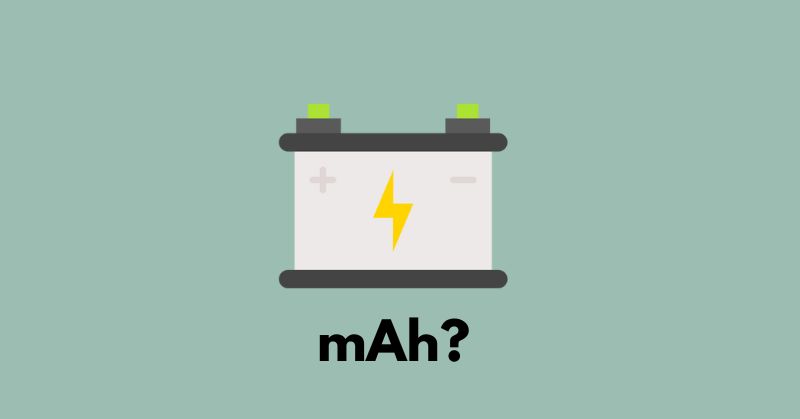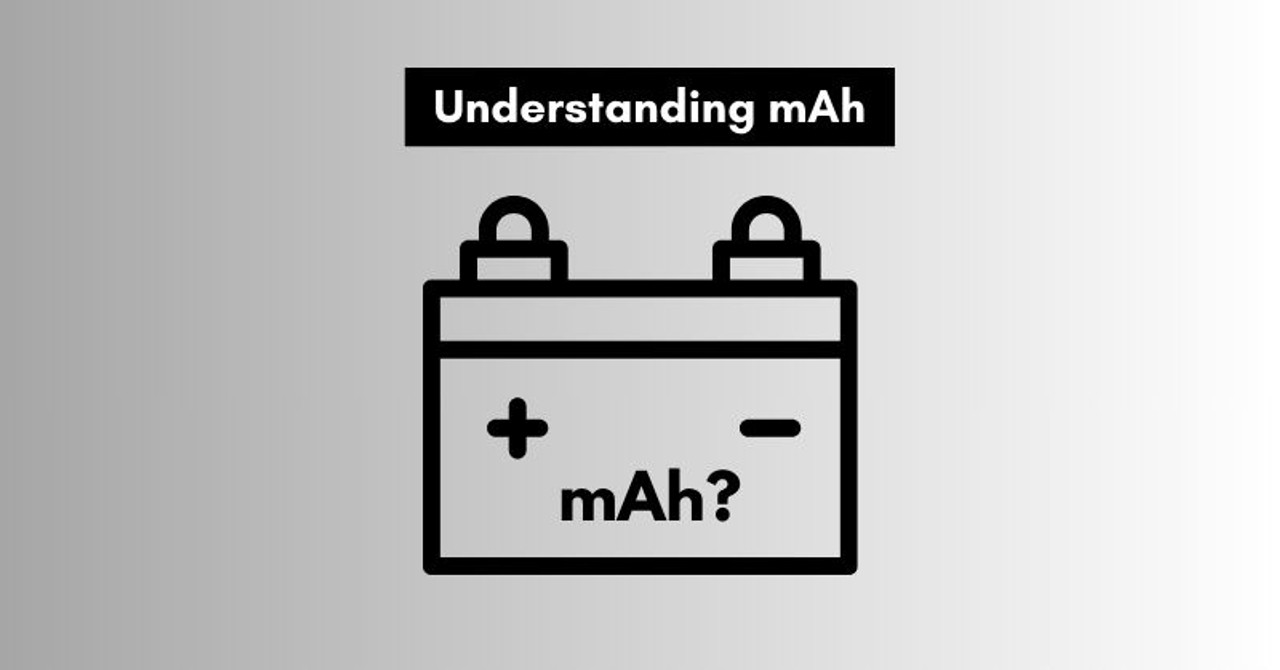What is mAh: The Basics of Battery Capacity You Must Know
When you look at a battery-powered device, you often see the abbreviation - mAh. This is when many people search online for "What does mAh mean".
Nowadays, we can't even think of living without batteries, as they power up most of the devices we use in our daily lives, such as mobile phones, digital cameras, laptops, electric vehicles, and the list goes on. Keeping this fact in mind, we must ensure that these devices have enough battery charging to work for a day or two. This is where the mAh concept plays a key role.
Battery capacity is measured in mAh. If we describe it technically, mAh shows the number of milliamps a battery can provide in one hour. This article helps you better understand mAh meaning, as it presents everything, from what mAh is to how it impacts battery life and how to select the right battery mAh for your needs. Read more.
What is mAh?
The term "mAh" is a short form of milliamp hours - a small unit to measure the battery capacity, as stated earlier. In simple words, mAh is the amount of current a battery can provide for 1 hour before you charge it fully. Technically speaking, mAh is the amount of electrical charge stored in a battery. The technical breakdown of mAh is as follows.
mAh = mA (milliamps) x h (hours)

The charge capacity and how long a battery can run a device or appliance is indicated by the battery's mAh. For instance, if you have a 4000 mAh battery, it can provide 4 amps of current for one hour, 2 amps of current for two hours, and 1 amp of current for four hours.
Though mAh is a key factor in determining the battery life, it is not the only one. Other factors include the usage patterns, screen brightness, the type of device you use, and more.
What does mAh mean on batteries?
As mentioned earlier, mAh is a unit to measure electrical charge on the battery or battery capacity. A higher mAh rating means the battery can store more electrical energy and can last for long hours.
mAh on a mobile battery
mAH on a mobile battery refers to the stored electrical charge to power up and run the device. If you want to calculate the backup time of your mobile device, use the formula below.
backup time = mAh / discharged current in mA
Let's calculate the backup time of a mobile phone that has a 3000 mAh battery. If your device consumes 300 amps of current continuously, the backup time will be calculated as follows.
backup time = 3000 / 300 = 10h
It shows that your phone will work for 10 hours before you recharge it.
mAh on a car battery
When you see mAh on your car battery, it means how long you can drive before the battery runs out of charge. Generally, a higher mAh rating refers to longer drives and bigger storage capacities. Different batteries are available for cars. Lead-acid and lithium batteries are used more frequently.
The capacity of a lead-acid battery lies between 135 and 300 recharge cycles. Its performance starts degrading after 3 to 5 years. In comparison, a lithium-ion battery comes with longer life cycles and higher mAh ratings. It can last for over 5 years and 300 to 400 recharge cycles.
mAh on a rechargeable battery
The mAh rating on a rechargeable battery is the same as on a simple battery. However, rechargeable batteries can run high-power appliances and you can charge them thousands of times as and when needed.
Important note: The mAh rating is a key parameter for determining the battery life and capacity, but it can't measure the overall performance, especially if the device is more power-hungry. In that case, we should consider all potential factors, such as usage patterns, type of battery, chemistry, quality of manufacture, and more.
For example, a 5000 mAh battery apparently has higher capacity but it is not necessary that it will perform better than a 3000 mAh battery. The performance of a battery largely depends on the power consumption of the device and type of battery. A 3000 mAh battery can run your mobile phone the whole day, whereas a 5000 mAh battery may hardly power up your laptop for 4 to 5 hours.
How does mAh impact battery life?
As you know, mAh measures the battery capacity. It means that a battery with a higher mAh rating can hold more charge, and thus, it can power a device for longer. Apart from battery mAh, there are a couple of other factors that affect the battery life. They include the usage patterns, battery age, and power consumption of the device.
If the device uses more power to run, the battery will not be able to power it up for long hours, as it will drain early. The same is the case with the battery age. If you have an older battery, it won't be able to run the device all day. Similarly, if you use your mobile phone more frequently, it will drain more percentage of the battery, and thus, it will run out of charge in less time.
There is a simple relationship between the charging time and battery mAh. A higher mAh rating means the battery will take more time to charge fully, as it has to store more electric charge. In comparison, a lower mAh rating means that the battery will charge relatively faster, as it has a small capacity.
Remember, the charging time depends not only on the battery mAh rating. Some other factors also play their part in determining the charging time of the battery, such as the device usage during charging, cable quality, and the charging method. A good quality cable and adapter charge the device faster. On the other hand, if you charge a low mAh battery with a fast charging adapter, it will get overheated and the lifespan may reduce.
How to choose the right battery mAh for your needs?
Before looking at the mAh rating of the battery, it is crucial to assess your energy needs based on the device you use, such as electric vehicles, mobile phones, and home energy requirements.
If you want to choose the right mAh battery for your home, you can review your electricity bills to get an idea about the average annual energy you use. If you want to power up some specific appliances, you will have to calculate their starting and running wattage. Rating plates or nameplates will help you find power ratings of the desired appliances.
If the battery lifespan is your number-one priority, you should select a device with a higher mAh rating. In comparison, if you put weight and portability on priority, you should choose a smaller battery device with a lower mAh rating. It will charge more quickly compared to a device with a higher mAh rating, as it has less capacity to store electric charge.
On the other hand, if you plan to use the device for long hours and more frequently, a battery with a higher mAh rating will be a good option. But, it will take more time to charge fully. Therefore, you must consider all the features and overall value of the device. Customer service and the brand name matters a lot, too.
Keeping all these things in mind, we can say that a device or a battery with a higher mAh rating can't always be the best choice if it has a poor reputation or does not offer other key features.
If you want to keep your devices running even if their batteries run out of charge, buy power banks, external batteries, or other similar backup power sources that can run your devices when their internal batteries get low on charge.
Final thoughts
If you are wondering what does mAh on a battery mean, it measures battery capacity, affects the battery life greatly, and helps users select the right battery based on their preferred devices. Whether you want to replace the existing battery or are looking forward to buying a new device, don't forget to check the mAh ratings to ensure the battery perfectly meets your power consumption requirements.
To explore more about the mAh meaning, how it impacts the battery life, and how you can choose the right battery mAh, make sure you read through the discussion above carefully. It has covered everything you need to know about the importance of the mAh rating for battery-powered devices.
Frequently asked questions
Is a higher mAh battery better?
A battery with a higher mAh rating means it can store more electric charge and thus can run a device for long hours compared to a battery with a lower mAh rating. But, it is not necessary that a higher mAh battery is always better than a lower mAh battery. A couple of other factors come into play, including usage patterns and power consumption of the device. On the other hand, batteries with higher mAh ratings will take more time to charge.
What does a 5000 mAh battery mean?
A 5000 mAh battery means that it can deliver 5 amps of current for one hour, 2.5 amps of current for two hours, 1 amp of current for five hours, 0.5 amps of current for 10 hours, and so on. Usually, for moderate usage, a 5000 mAh battery can last for 1 to 2 days. In comparison, for heavy usage, the same battery can only power up a device for about 8 to 10 hours.
Which is better, 5000 mAh or 6000 mAh?
It depends on two major factors: battery age and usage. The higher the usage, the lesser the run time will be. If the device consumes less power per hour, a 5000 mAh battery can last longer than a 6000 mAh battery attached to a high power-consuming device. In terms of storing the electrical charge, a 6000 mAh battery offers more capacity than a 5000 mAh battery.











